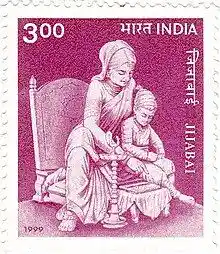The King's Mother
Who should a woman be more dedicated to? Her father or her husband? Jijabai was torn between the two! Her dreams and hopes, however, were fulfilled by the man who was born from her womb. The Rajmata had prepared her son for big deeds.

A stamp in honour of Jijabai; Source: Wikimedia Commons
In Sindkhed in the 1590s lived a Sardar who served the Nizam Shahi. He was named Lakhuji Jadhavrao. Jadhavrao was a proud and arrogant person. His high position and an even higher status as an eminent Maratha noble and Sardar served his arrogance even more.
To him and Malasa Bai was born a beautiful, ever so gentle and virtuous Jijabai. Being the daughter of a noble, marriage proposals came for her from far and wide from a very early age. Her knots were finally tied with Shahaji Bhosle, who served the Nizam Shah just like her father. He was a spirited warrior and a diplomat - one of the best in his trades.
Love was soon ignited between the young couple and all was good except for one thing.
The ambitions of men in power sandwiched the interests of the young Jijabai. Both her families stood in a contest with each other and Jijabai was torn apart. On one edge stood her companion Bhonsle while on the other stood her father Jadhavrao.
The ill feelings and bitterness only grew with time. Jijabai was brought forth to choose her loyalties. The time for the test came when Lakhuji left the kingdom to join the Mughal forces at Delhi to fight against the Nizam Shah and to draw his revenge from Shahaji.
As custom demanded, she stood beside her husband at the fort of Shivneri, ever so devotedly. Yet, neither her father nor her husband aspired what Jijabai dreamt of.
Both patriarchs served other rulers while she yearned for a free kingdom of her own and to become a Queen. She wanted the Marathas to establish their dynasty.
Bhonsle and Jijabai had 8 children in total; six daughters and two sons. A great warrior and a skilled politician, Shivaji was born from the determined will lady's womb. Just like her father, he would grow to be an administrator, an embodiment of respect and virtue. In her motherly role, Jijabai did wonders. She taught her son what her husband and father couldn't.
She filled him with a sense of duty, with fortitude and courage. She made sure that her son could come out of any hardships and finally she taught him how to build a kingdom that would be a symbol of freedom.
Her hard work paid off when Shivaji grew up to become the founder of the Marathas. She did not ever become Queen but Queen Regent she certainly was. Jijabai then moved to Poona to look after her husband's Jagir along with little Shivaji. When her son left for Agra, she was the one who stood strong and managed the kingdom single-handedly.
Much happened with the Queen after that. A mix of good and bad, hard and easy, complicated and simple, happy and painful and yet she bore them all, silently like a mountain.
When Bhonsle died, she was heartbroken yet kept standing for her children. It was only when Shivaji was coronated that her heartfelt contentment. In 1674, he ascended on the golden throne and became the divine ruler of the Marathas.
Unfortunately, the Rajmata did not live long to see her king-son ruling over the kingdom. She soon passed away at the foothills of Raigad Fort, in the Pachad village on 17 June 1674. Her death was mourned equally by her son and the whole kingdom. They had all lost their mother. Today, the region of her last rites is considered sacred and is a symbol of maternal bond, a reminiscence of a love unequalled in the world.


